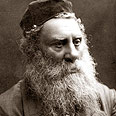
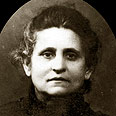
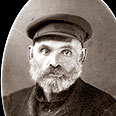
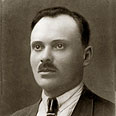
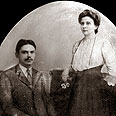
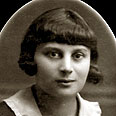
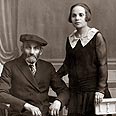
All we have left are those pictures. We looked through the albums, and Irit told us about her relatives – elderly, young people and children – all of whom suffered a terrible fate. Here's a peek into the album of Irit's mother, with Irit's comments.
Explanation on photos A-G on the right
A. My grandfather's grandfather – Yekutiel Ben Shlomo Keiles (his eldest daughter Ester – Rachel Keiles – Kaliko, was my mother's grandmother) was born in Bialystok in eastern Poland, in 1840. He was a blacksmith in the new city, Nova.
In 1912, Yekutiel Keiles was among the "non-Russia" Jews who met the authorities' criteria and were allowed to vote for the Russian parliament, the Duma, as one of the Jews' representatives. He died of an illness in 1927, after the death of two of his daughters that year. Yekutiel had six daughters and two sons, and three others whose names appear in the records of the Polish archive of Bialystok and who I didn't know about.
B. My grandfather's grandmother, Masha Bat Israel Keiles (the wife of Yekutiel Keiles. Her eldest daughter, Esther Rachel, was my mother's grandmother) was born in Bialystok in the middle of the 19th century and died in the 1920s. She had six daughters and two sons and three others who I didn't know about.
C. My grandfather's father (my great grandfather) Leib (Aryeh) Ben Hirsch Kaliko (the husband of Esther Rachel Keiles-Kaliko, my mother's grandmother) was born in Bialystok around 1860 and worked as a weaver. After the death of his wife Esther-Rachel, he immigrated with his young daughter to America (around 1925) following his two sons (Yerachmiel-Robert and Israel-Izidor) who immigrated before him. He spent the rest of his life in New York, where he died. He had five sons and two daughters.
D. My grandfather, my mother's father, Shimon Kaliko. The eldest grandson of Yekutiel Keiles (the eldest son of Esther-Rachel Keiles and Leib Kaliko of Bialystok). He was born in Bialystok in 1885 to a family which had been living there for generations. As young man he worked as a skinner in Smarhoń, near Minsk. He was active in the Bond – the Jewish laborers' movement – and was sent to prison for subversive socialist activity against the czar. In jail he met his future wife (my grandmother), Chaya Bella Norman of Vileyka, Belarus, who was also active in the Bond movement. They married in 1908-1910 in Smarhoń. (His eldest daughter was my mother, Nechama Kaliko, who was born in Smarhoń in 1912).
During World War I, my grandfather was expelled with his wife and three small children, along with the rest of Smarhoń's Jews. They were forced to march from Smarhoń to Minsk. There, they lost their three children in one day following a rubella (or measles) plague which spread among the refugees. Shimon and his wife, Chaya-Bella, fell into deep grief. Even before the end of the war, he reached Kazan (the Tatarstan capital) in search of his eldest daughter (my mother, Nechama Kaliko), who escaped with her grandfather and aunts on a train from Vileyka (in Belarus) to Tatarstan during the expulsion.
In Kazan he has another son and daughter (Zvi-Hirschel, 1916, and Tzipora-Feigel, 1918). After several years in Kazan, he moved with his family to his hometown – Bialystok, where his family lived – a great tribe of the Keiles and Kaliko family members. Their seventh son Gershon was born in Bialystok in 1920.
Due to difficulties providing for his family, they moved in 1926-7 to his wife's hometown – Vileyka, under the Vilna Governorate, on the Belarus border. My grandfather and grandmother, Shimon and Chaya Bella, refused to flee the town on the day the Germans entered – June 22 1941, believing that the enlightened Germans would not hurt them. According to testimonies, my grandfather, Shimon Kaliko, was burnt alive along with the other men of Vileyka, while they were imprisoned in the local jailhouse which was set on fire. My grandmother and her small grandson were apparently thrown into pits outside Vileyka and shot in the same method which was customary in the areas surrounding Vilna, and in all of Belarus and Lithuania.
E. My grandfather and grandmother, may God avenge their blood, Shimon Kaliko from Bialystok and Chaya Bella Norman from Vileyka, on their wedding day in Smarhoń 1908-1910. They were both murdered in Vileyka on June 22, 1941 with their small grandson.
F. My mother, Nechama (Kaliko) Malberger, in 1930 in Vileyka, Belarus.
G. Shalom Norman (the brother of my great grandfather, Kalman Norman) and his daughter Hannah Heine Norman, in Vileyka. Hannah perished in the Holocaust.
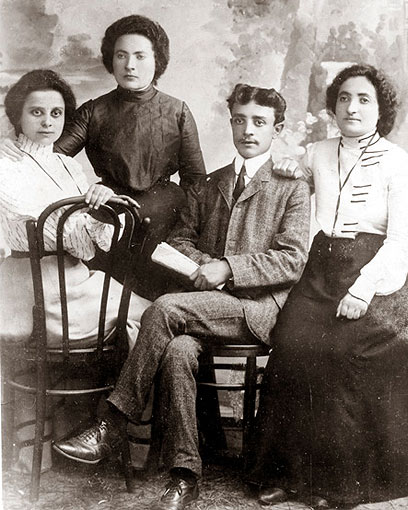
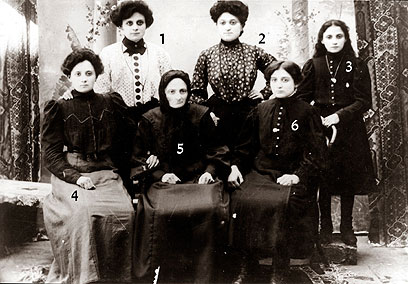

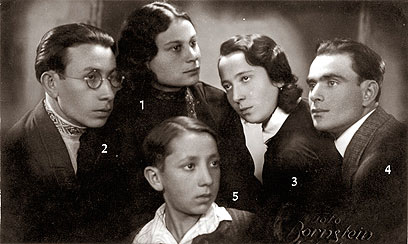
Avraham and the two small siblings were sent to America, to their father (my grandfather) and lived there till they died. Hannah and her husband, Aharon, perished in the Holocaust with their little boy, Shefsel Klaiman, in the town of Ozarow near Józefów, on the Vistula.
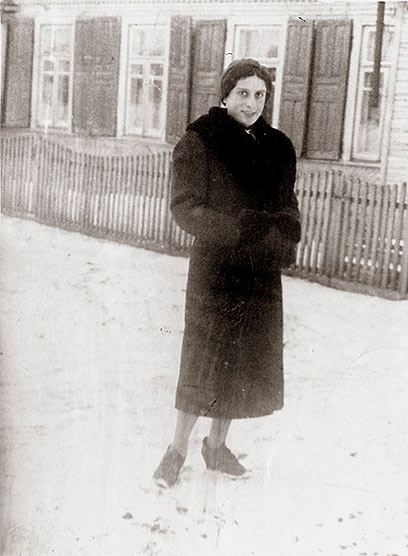
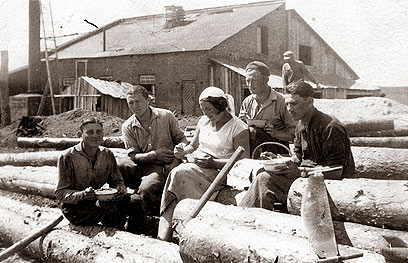
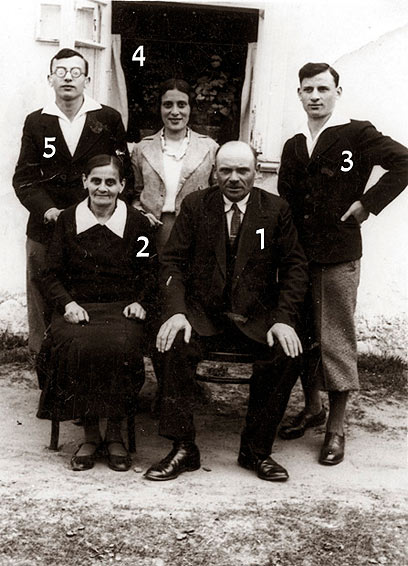
7. My grandfather and grandmother Shimon (1) and Chaya Bella Kaliko (2), with their children: Zvi-Hirschel (3), Tzipora-Feigel (4) and Gershon (5), at the entrance to their home on May 10, 1936. The picture was sent to my parents' home in the Land for Israel as a commemoration.
Zvi, an officer in the Polish army, was murdered by the Russians (or Germans). Tzipora, a partisan, was killed in the forests of Vileyka, while Gershon managed to escape on the last train into Russia and immigrated to Israel with his family in 1960.
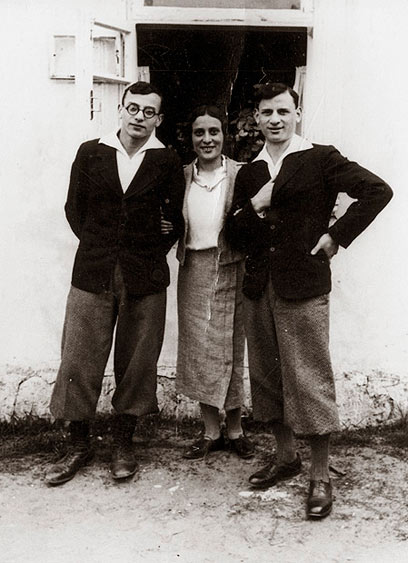
8. My mother's three siblings: Zvi-Hirschel Kaliko, Tzipora-Feigel Kaliko and Gershon Kaliko at the entrance to their home in Vileyka on May 10, 1936.
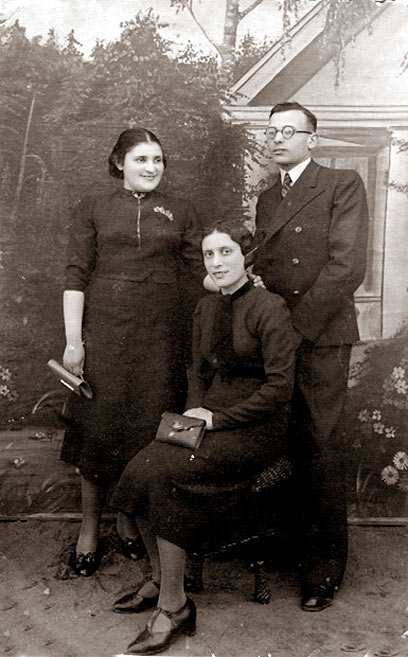
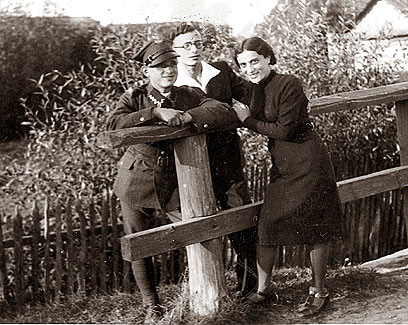
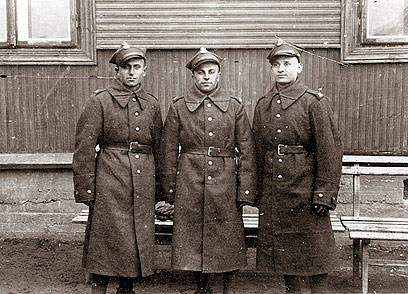
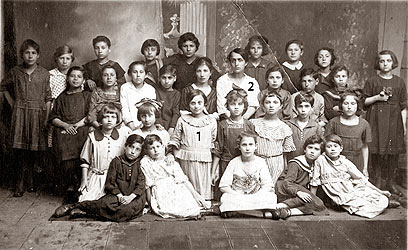
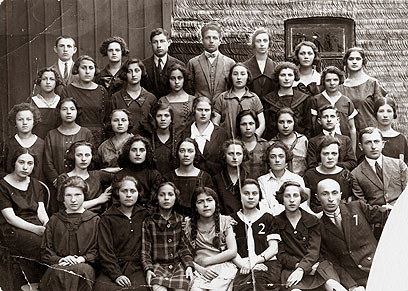
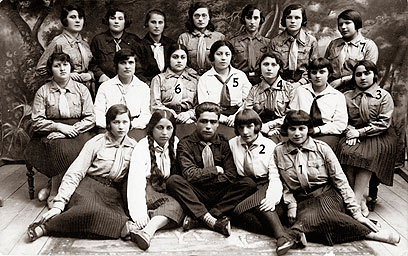
14. Hashomer Hleumi ("National Guard") cell in Vileyka, 1930. The Kadima group: 1 – my mother, Nechama Kaliko, 2 – Heine Norman (cousin), 3 – Rochale Greenhaus, 4 – Chasya Greenhaus, 5 – Sara Hopstein, 6 – Leah Lapidot, 7 – Batya Kolbak. They all immigrated to Israel and maintained close ties with my mother all their lives.
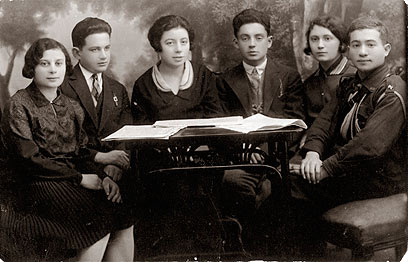
15. Members of Hashomer Haleumi committee in Vileyka, 1931. From right to left: Daniel Persky, Chasya Greenhaus, Zvi Alfirovitch, Sara Hopstein, Levy Tov, and my mother – Nechama Kaliko.
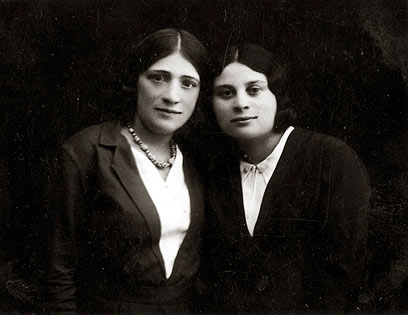
16. My mother and her cousin, Heine Norman, in Vileyka 1932. Members of Hashomer Haleumi movement, both immigrated to Israel in the early 1930s, lived in Jerusalem all their lives and maintained a close relationship.
For all trips to the past – click here
- Follow Ynetnews on Facebook















